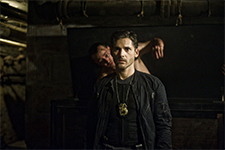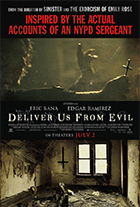Deliver Us From Evil
|  There have been a lot of exorcism movies over the past 10 years—far too many, most people, even hardened horror fans, would say—which puts Scott Derrickson’s Deliver Us From Evil in the precarious position of risking summary dismissal as just another one of those. Derrickson himself is partially responsible for reviving the exorcism subgenre with The Exorcism of Emily Rose (2005), the first serious demonic possession film since The Exorcist spawned a legion of bad imitators in the 1970s. In many ways, Deliver Us From Evil is a significantly different film than Emily Rose, although they are both loosely based on true stories, both feature a heroic Catholic priest as a primary character (although the heroism of the two priests is quite different), and, most importantly, both share the central thematic concern of an agnostic confronted and eventually transformed by clear supernatural evil. There have been a lot of exorcism movies over the past 10 years—far too many, most people, even hardened horror fans, would say—which puts Scott Derrickson’s Deliver Us From Evil in the precarious position of risking summary dismissal as just another one of those. Derrickson himself is partially responsible for reviving the exorcism subgenre with The Exorcism of Emily Rose (2005), the first serious demonic possession film since The Exorcist spawned a legion of bad imitators in the 1970s. In many ways, Deliver Us From Evil is a significantly different film than Emily Rose, although they are both loosely based on true stories, both feature a heroic Catholic priest as a primary character (although the heroism of the two priests is quite different), and, most importantly, both share the central thematic concern of an agnostic confronted and eventually transformed by clear supernatural evil.The agonistic in this case is Ralph Sarchie (Eric Bana), a hardened Bronx police sergeant who confronts on a daily basis the evil that men do, especially since he has a kind of sixth sense (what his partner calls his “radar”) that draws him to the worst of the worst. A former altar boy and lapsed Catholic, Sarchie refuses to go to church with his wife, Jen (Olivia Munn), perhaps because his experiences on the mean streets of New York have convinced him that there can’t possibly be a benevolent God in the universe. Things begin to change when he and his partner, Butler (Joel McHale, strangely but effectively cast against type), begin investigating a series of events—a case of domestic violence, a deranged woman throwing her toddler into the lion’s den at the zoo, strange occurrences at a brownstone owned by an immigrant family—that are later revealed to be interconnected via a trio of Iraq War veterans who seem to have brought something home with them. Sarchie to tries to explain all the events through the usual channels—drug use, PTSD, mental illness, and so on—but his convictions are slowly whittled away by both the inexplicable events with which he is faced and the arguments of Father Mendoza (Édgar Ramírez), a priest whose expertise in demonology leads him to the conclusion that Sarchie is not facing what he calls “secondary evil,” essentially the bad that men do, but rather “primary evil, ” which he calls “another thing entirely.” The difference between those two kinds of evil forms the philosophical bedrock of Derrickson’s film, giving it a sense of purpose that most horror films—even very effective ones—often lack. This is a film, after all, that has as much room for gruesome violence as it does for a compelling debate about the nature of good and evil and the role of God in the world. While Derrickson has also worked in science fiction (2008’s ill-received remake of The Day the Earth Stood Still) and contributed to a number of scripts for other directors (including Land of Plenty for Wim Wenders and this year’s Devil’s Knot for Atom Egoyan), he is most at home in the horror genre. Like his most recent film, Sinister (2012), Deliver Us From Evil is a compendium of horror movie devices in service of a story that is decidedly more original than most. Granted, he relies a bit too heavily on jump-out-of-the-dark scares and false alarms, but he knows mood and tone and how to sustain them, and he has a particular gift for taking ordinary, banal objects and making them indelibly creepy (one of the film’s most memorable images is a stuffed owl backpack rolling across the floor on its own). He is also gifted in understanding how to effectively mix genres. The Exorcism of Emily Rose was essentially a mash-up between a possession movie and a courtroom drama, and he does something similar in making Deliver Us From Evil both a possession movie and a police procedural. He proves just as adept at one as he does the other, and he makes them work together harmoniously, so their interweaving feels organic, rather than forced (something that sometimes marred Emily Rose, which implies artistic growth between the two films). He makes the most of the film’s urban environment, which often involves old buildings, dank basements, and dark alleys, suggesting that the enormity of big-city life offers the best possible hiding place for primary evil. He also gets good performances from his robust cast. Bana (Munich) once again plays an effectively tortured protagonist (the scene in which he erupts at Jen about all he has seen that week reminds us that the film is just as much about the day-to-day realities of human evil and frailty as it is about the supernatural variety), while Édgar Ramírez (who was so good as the titular terrorist in Olivier Assayas’s Carlos) gives Father Mendoza a genuine sense of soul that offsets the cliché of the handsome, black-leather-clad stud who also happens to be a priest. He conveys a man who has endured the worst that life has to offer and emerged on the other side, battered, but all the more determined for it. His spirituality is quiet, intense, and convincing. Derrickson is an open man of faith (which, in and of itself, makes him an absolute rarity in Hollywood) who reads Flannery O’Connor and G.K. Chesterton and concedes that his interest in horror is moored primary in his fascination with the polarities of good and evil. In a 2005 interview in Christianity Today, he argued that horror is the perfect Christian genre because “it tackles issues of good and evil more than any other genre, it distinguishes and articulates the essence of good and evil better than any other genre, and my feeling is that a lot of Christians are wary of this genre simply because it’s unpleasant. The genre is not about making you feel good, it is about making you face your fears. And in my experience, that’s something that a lot of Christians don’t want to do.” Derrickson is nothing if not a daring filmmaker, given that his horror films court criticism from both the media establishment, which typically refuses to concede the artistry of horror films and is skeptical of any art with a genuine religious subtext, and from the Christian establishment, which tends to elevate the importance of explicit religious content over any kind of artistry (hence the otherwise inexplicable love among evangelicals for movies like Facing the Giants and Fireproof). Not surprisingly, Deliver Us From Evil has been criticized—often unfairly—on both fronts, which is unfortunate given that Derrickson has successfully breathed life into some of the more exhausted aspects of the horror genre and produced a film that both scares and provides significant food for thought. Copyright ©2014 James Kendrick Thoughts? E-mail James Kendrick All images copyright © Screen Gems |
Overall Rating: 

 (3)
(3)


